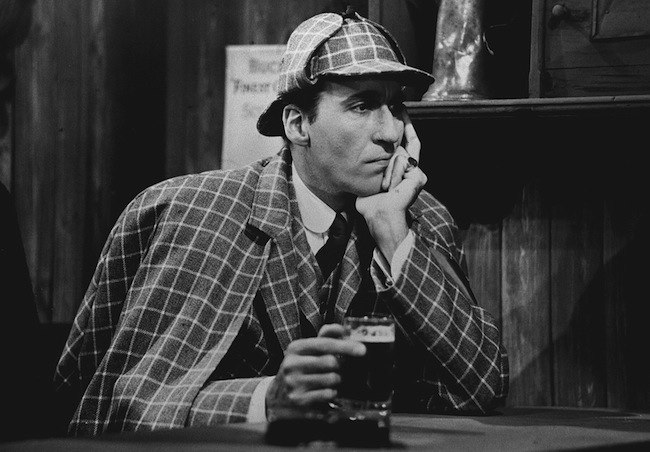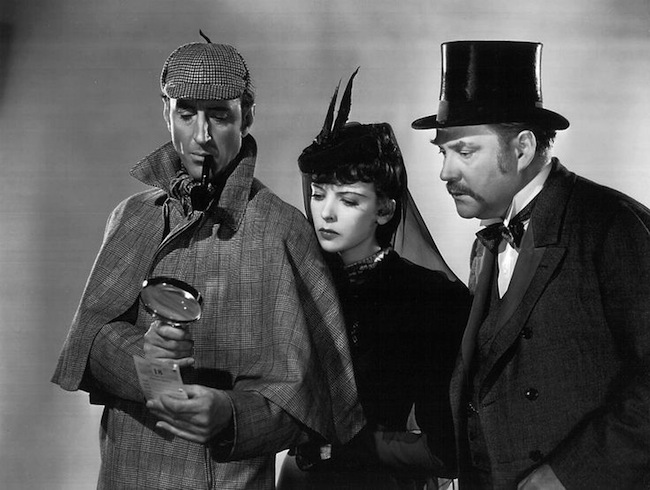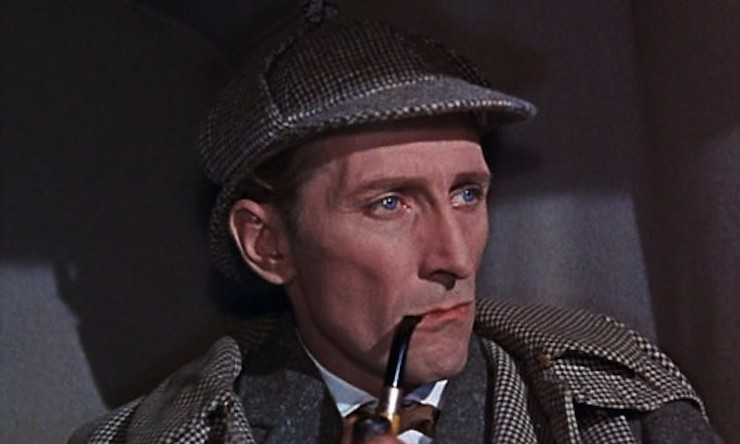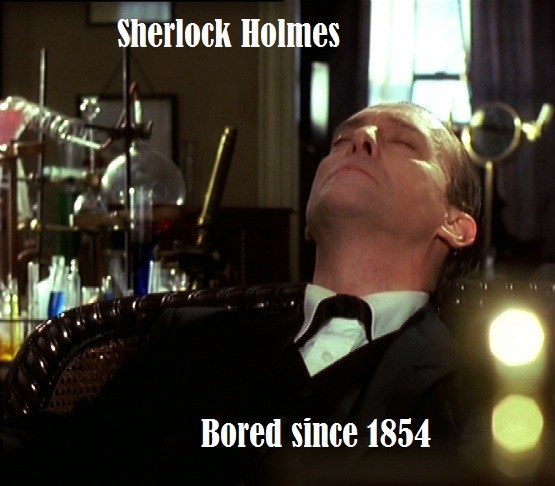When people are asked why they like Sherlock Holmes, they provide a whole spectrum of replies. Some readers talk about his intelligence, or his integrity. Others read the stories for the adventure aspect. (Today we have a train chase! And a fight over a waterfall!) Or the problem-solving (it’s a sealed room mystery, and the victim was found dead by poison). Or even the sense of humour. (I am convinced that in “The Adventure of the Dying Detective,” Holmes was getting amusement value out of convincing Watson that he’d gone mad and thought that oysters were going to take over the world.) And there are the other main characters, such as Watson and even Lestrade and Gregson, and the antagonists—Professor Moriarty, Irene Adler, Colonel Moran, Dr Grimesby Roylott…
But ultimately the stories revolve round Sherlock Holmes. Even later homages that focus on other characters such as Watson, Irene Adler, or Professor Moriarty, usually make Holmes a major background figure, or at least have his absence be a point in the narrative. Anyone trying to produce a new story based on Holmes, or even with Holmes as a background character, needs to have a clear idea of who Holmes is to avoid the story feeling “wrong.” We’ve all read or seen homages/pastiches/fanfiction where we ended up saying “I’m not sure exactly what it was, but it just didn’t feel right.”
Yet when other people do create homages to Holmes—be they literature, movies, television series, animation, manga, computer games, or whatever—they often emphasize different parts of his character, depending on the needs of the story and the author’s own perception of Holmes. This isn’t wrong. The fact that Holmes has all these facets only makes him more human.
Some recent versions (the Sherlock television series, or the Sherlock Holmes movies with Robert Downey, Jr.) comment on his social awkwardness and possible psychological issues. (“I’m not a psychopath, Anderson, I’m a high-functioning sociopath. Do your research.”) Others investigate his emotional side and his private life (the recent movie Mr. Holmes, or the earlier The Private Life of Sherlock Holmes and The Seven Per Cent Solution). The Basil Rathbone movies made during the Second World War stress Holmes’ patriotism and have him fighting Nazis. Crossovers with other authors’ characters often emphasise his mental qualities, but may also bring out his ethics, his prickly personality, and his fundamental morality. (Yes, I am one of those people who prefer to envisage Holmes as an ultimately decent man. My own reading of the stories…)
I’m going to quote a few examples of his qualities, taken from Doyle’s short stories. There are certainly many more examples available, and I apologize to anyone whose favorite quotation I’ve left out. I also apologize to anyone whose favorite Holmesian personal quality I’ve left out. Like all of us—even Holmes—my perspective is limited.

Withdrawn
From “The Greek Interpreter” (1893):
During my long and intimate acquaintance with Mr. Sherlock Holmes I had never heard him refer to his relations, and hardly ever to his own early life. This reticence upon his part had increased the somewhat inhuman effect which he produced upon me, until sometimes I found myself regarding him as an isolated phenomenon, a brain without a heart, as deficient in human sympathy as he was pre-eminent in intelligence. His aversion to women, and his disinclination to form new friendships, were both typical of his unemotional character, but not more so than his complete suppression of every reference to his own people.
Unsociable
From “The ‘Gloria Scott’” (1893):
“You never heard me talk of Victor Trevor?” he said. “He was the only friend I made during the two years that I was at college. I was never a very sociable fellow, Watson, always rather fond of moping in my rooms and working out my own little methods of thought, so that I never mixed much with the men of my year.”
Focuses Only on Problems
From “Wisteria Lodge” (1908):
“My mind is like a racing engine, tearing itself to pieces because it is not connected up with the work for which it was built. Life is commonplace, the papers are sterile; audacity and romance seem to have passed for ever from the criminal world.”

Dogged and Persistent
From “The Five Orange Pips” (1891):
“I have spent the whole day,” said he, “over Lloyd’s registers and the files of old papers, following the future career of every vessel which touched at Pondicherry in January and in February in ‘83…”
Lack of Tact
From “The Blue Carbuncle” (1892):
“On the contrary, Watson, you can see everything. You fail, however, to reason from what you see.”
Easily Bored
From “The Copper Beeches” (1892):
“Man, or at least criminal man, has lost all enterprise and originality. As to my own little practice, it seems to be degenerating into an agency for recovering lost lead pencils and giving advice to young ladies from boarding-schools.”
Pride
From “The Six Napoleons” (1904):
A flush of colour sprang to Holmes’ pale cheeks, and he bowed to us like the master dramatist who receives the homage of his audience. It was at such moments that for an instant he ceased to be a reasoning machine, and betrayed his human love for admiration and applause.
Intelligent and Inventive
From “The Dancing Men” (1903):
“What one man can invent another can discover.”

Physical
From “The Solitary Cyclist” (1903):
“He [Woodley] had a fine flow of language, and his adjectives were very vigorous. He ended a string of abuse by a vicious back-hander, which I failed to entirely avoid. The next few minutes were delicious. It was a straight left against a slogging ruffian. I emerged as you see me. Mr. Woodley went home in a cart.”
Unique Perspective
From “The Copper Beeches” (1892):
“… it is one of the curses of a mind with a turn like mine that I must look at everything with reference to my own special subject. You look at these scattered houses, and you are impressed by their beauty. I look at them, and the only thought which comes to me is a feeling of their isolation, and of the impunity with which crime may be committed there.”

Observant (too many cases to quote)
From “The Speckled Band” (1892):
For answer Holmes pushed back the frill of black lace which fringed the hand that lay upon our visitor’s knee. Five little livid spots, the marks of four fingers and a thumb, were printed upon the white wrist.
“You have been cruelly used,” said Holmes.”
Exacting Standards
From “A Scandal in Bohemia” (1891):
“Did I not tell you how quick and resolute she was? Would she not have made an admirable queen? Is it not a pity she was not on my level?”
“From what I have seen of the lady, she seems, indeed, to be on a very different level to our Majesty,” said Holmes coldly.

Loyal to Friends
From “The Three Garridebs” (1924):
“You are right,” he cried, with an immense sigh of relief. “It is quite superficial.” His face set like flint as he glared at our prisoner, who was sitting up with a dazed face. “By the Lord, it is as well for you. If you had killed Watson, you would not have got out of this room alive.”
Ethical
From “A Case of Identity” (1891):
“The law cannot, as you say, touch you,” said Holmes, unlocking and throwing open the door, “yet there never was a man who deserved punishment more. If the young lady has a brother or a friend he ought to lay a whip across your shoulders. By Jove!” he continued, flushing up at the sight of the bitter sneer upon the man’s face, “it is not part of my duties to my client, but here’s a hunting-crop handy, and I think I shall just treat myself to –“
He took two swift steps to the whip, but before he could grasp it there was a wild clatter of steps upon the stairs, the heavy hall door banged, and from the window we could see Mr. James Windibank running at the top of his speed down the road.
Empathetic
From “The Boscombe Valley Mystery” (1891):
“God help us!” said Holmes, after a long silence. “Why does Fate play such tricks with poor helpless worms? I never hear of such a case as this that I do not think of Baxter’s words, and say, ‘There, but for the grace of God, goes Sherlock Holmes.’”

Socially Aware (yes, really)
From “The Naval Treaty” (1893):
“The Board schools.”
“Lighthouses, my boy! Beacons of the future! Capsules, with hundreds of bright little seeds in each, out of which will spring the wiser, better England of the future.”
A Sense of Proportion (occasionally)
From The Valley of Fear (1915):
It was late that night when Holmes returned from his solitary excursion. We slept in a double-bedded room, which was the best that the little country inn could do for us. I was already asleep when I was partly awakened by his entrance.
“Well, Holmes,” I murmured, “have you found anything out?”
He stood beside me in silence, his candle in his hand. Then the tall, lean figure inclined towards me. “I say, Watson,” he whispered, “would you be afraid to sleep in the same room with a lunatic, a man with softening of the brain, an idiot whose mind has lost its grip?”
“Not in the least,” I answered in astonishment.
“Ah, that’s lucky,” he said, and not another word would he utter that night.
Some people blame inconsistencies in his characterization on the original author, Sir Arthur Conan Doyle, while others point the finger at Watson, calling him an unreliable narrator. The fundamental point which I would take from all of the above is that Holmes was human. It’s that humanity, and all the complexities in the human character, which have made Holmes a character that has lasted for more than a hundred years, and who has been and will remain an icon in popular culture. We know who Sherlock Holmes is. He’s real.
This article was originally published in January 2016.
 Genevieve Cogman started on Tolkien and Sherlock Holmes at an early age, and has never looked back. But on a perhaps more prosaic note, she has an MSC in Statistics with Medical Applications and has wielded this in an assortment of jobs: clinical coder, data analyst, and classifications expert. She is the author of The Invisible Library series—The Invisible Library, The Masked City, and The Burning Page—and she has also previously worked as a freelance roleplaying game writer. Genevieve’s hobbies include patchwork, beading, knitting, and gaming, and she lives in the north of England.
Genevieve Cogman started on Tolkien and Sherlock Holmes at an early age, and has never looked back. But on a perhaps more prosaic note, she has an MSC in Statistics with Medical Applications and has wielded this in an assortment of jobs: clinical coder, data analyst, and classifications expert. She is the author of The Invisible Library series—The Invisible Library, The Masked City, and The Burning Page—and she has also previously worked as a freelance roleplaying game writer. Genevieve’s hobbies include patchwork, beading, knitting, and gaming, and she lives in the north of England.











